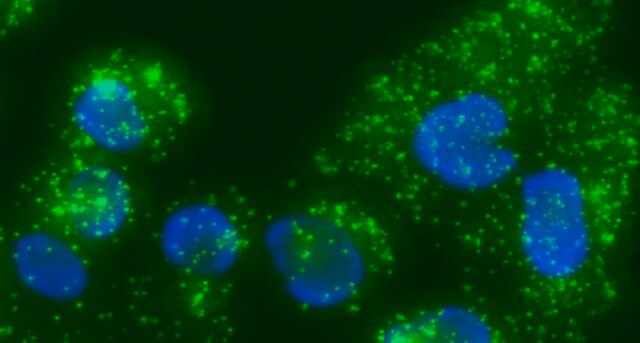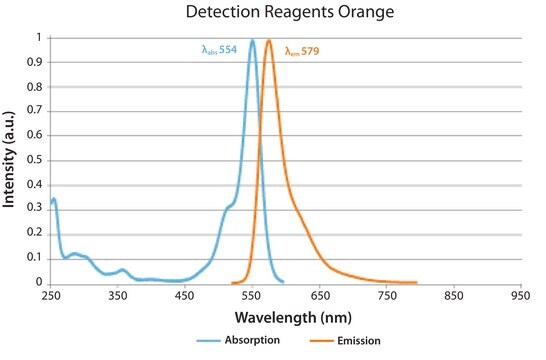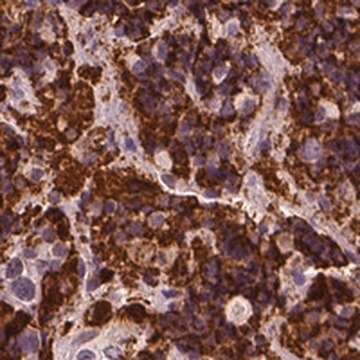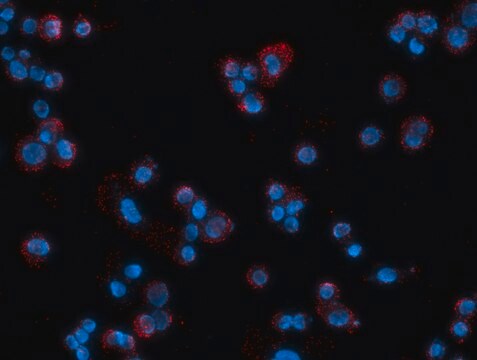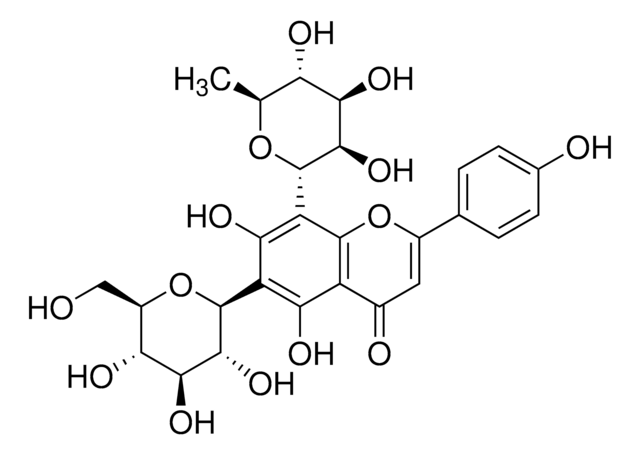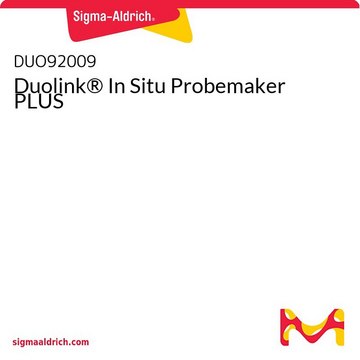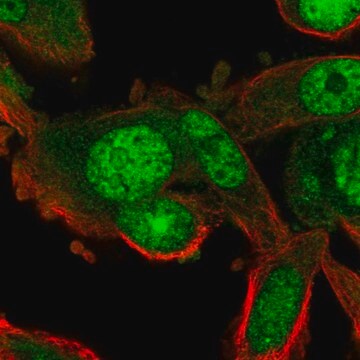MABT1489
Anti-Kinesin Light Chain Antibody, clone 63-90
clone 63-90, from mouse
동의어(들):
KLC1, KLC2, KLC
로그인조직 및 계약 가격 보기
모든 사진(1)
About This Item
UNSPSC 코드:
12352203
eCl@ss:
32160702
NACRES:
NA.43
클론:
63-90, monoclonal
application:
IHC
IP
WB
IP
WB
종 반응성:
squid, rat, mouse
기술:
immunohistochemistry: suitable (paraffin)
immunoprecipitation (IP): suitable
western blot: suitable
immunoprecipitation (IP): suitable
western blot: suitable
citations:
추천 제품
생물학적 소스
mouse
항체 형태
purified antibody
항체 생산 유형
primary antibodies
클론
63-90, monoclonal
종 반응성
squid, rat, mouse
포장
antibody small pack of 25 μg
기술
immunohistochemistry: suitable (paraffin)
immunoprecipitation (IP): suitable
western blot: suitable
동형
IgG1κ
NCBI 수납 번호
타겟 번역 후 변형
unmodified
유전자 정보
rat ... Klc1(171041)
관련 카테고리
일반 설명
Kinesin light chain (UniProt: P37285 and B2GV74 for KLC1 and KLC2, respectively) is encoded by the Klc1/Klc2 (also known as Klc, Kns2) gene (Gene ID: 171041/309159) in rat. Kinesin is a microtubule-associated force-producing protein that may play a role in organelle transport. The kinesin light chain (KLC) may function in coupling of cargo to the heavy chain or in the modulation of its ATPase activity. Kinesin light chain 1 is expressed in the brain tissue and exists as an oligomeric complex of two heavy and two light chains. It also contains six tetratricopeptide repeats (TPR). The heavy chains of kinesin have a microtubule-binding ATPase motor domain at their amino terminus, a neck coil, and an extended series of coiled coils, separated by a hinge region, that results in heavy-chain dimerization. Kinesin light chains can associate with the heavy-chain coiled coils at the carboxyl-terminal region. The light chains bind cargoes and regulate its activity. KLCs through their TRP repeat domains can recognize shirt linear peptide motifs found on cargo proteins. In the absence of any cargo binding, kinesin-1 exists in a folded compact state, which prevents unnecessary cycles of ATP hydrolysis. However, in the cargo-bound active state inhibition is relieved and it adopts a more elongated structure that can hydrolyze ATP and translocate along microtubules. Point mutations in Klc gene can affect functional domains in kinesin, which can result in late-onset dying-back neuropathies in sensory or motor neurons. (Ref.: Yip, YY., et al. (2016). Proc. Natl. Acad. Sci. USA 113(9); 2418-2423; Pigino, G., et al. (2009). Proc. Natl. Acad. Sci. USA 106(14); 5907-5912).
특이성
Clone 63-90 detects both KLC1 and KLC2. It targets an epitope with in the N-terminal region.
면역원
Purified rat brain Kinesin light chain 1.
애플리케이션
Anti-Kinesin Light Chain, clone 63-90, Cat. No. MABT1489, is a mouse monoclonal antibody that detects Kinesin light chain and has been tested for use in Immunohistochemistry (Paraffin), Immunoprecipitation, and Western Blotting.
Immunohistochemistry (Paraffin) Analysis: A 1:50 dilution from a representative lot detected Kinesin Light Chain in rat cerebral cortex tissue sections.
Western Blotting Analysis: 4 µg/mL from a representative lot detected Kinesin Light Chain in rat brain tissue lysate.
Immunoprecipitation Analysis: A representative lot immunoprecipitated Kinesin Light Chain in Immunoprecipitation applications (Stenoien, D., et. al. (1997). Mol Biol Cell. 8(4):675-89).
Immunohistochemistry Analysis: A representative lot detected Kinesin Light Chain in Immunohistochemistry applications (Rahman, A., et. al. (1998). J Biol Chem. 273(25):15395-403).
Western Blotting Analysis: A representative lot detected Kinesin Light Chain in Western Blotting applications (Rahman, A., et. al. (1998). J Biol Chem. 273(25):15395-403; Stenoien, D., et. al. (1997). Mol Biol Cell. 8(4):675-89; Pigino, G., et. al. (2009). Proc Natl Acad Sci U S A. 106(14):5907-12; Pigino, G., et. al. (2003). J Neurosci. 23(11):4499-508).
Western Blotting Analysis: 4 µg/mL from a representative lot detected Kinesin Light Chain in rat brain tissue lysate.
Immunoprecipitation Analysis: A representative lot immunoprecipitated Kinesin Light Chain in Immunoprecipitation applications (Stenoien, D., et. al. (1997). Mol Biol Cell. 8(4):675-89).
Immunohistochemistry Analysis: A representative lot detected Kinesin Light Chain in Immunohistochemistry applications (Rahman, A., et. al. (1998). J Biol Chem. 273(25):15395-403).
Western Blotting Analysis: A representative lot detected Kinesin Light Chain in Western Blotting applications (Rahman, A., et. al. (1998). J Biol Chem. 273(25):15395-403; Stenoien, D., et. al. (1997). Mol Biol Cell. 8(4):675-89; Pigino, G., et. al. (2009). Proc Natl Acad Sci U S A. 106(14):5907-12; Pigino, G., et. al. (2003). J Neurosci. 23(11):4499-508).
Research Category
Cell Structure
Cell Structure
품질
Evaluated by Immunohistochemistry (Paraffin) in rat hippocampus tissue sections.
Immunohistochemistry (Paraffin) Analysis: A 1:50 dilution of this antibody detected Kinesin Light Chain in rat hippocampus tissue sections.
Immunohistochemistry (Paraffin) Analysis: A 1:50 dilution of this antibody detected Kinesin Light Chain in rat hippocampus tissue sections.
표적 설명
~62 and 70 kDa observed for KLC1 and KLC2, respectively; 63.75 and 68.61 calculated for KLC1 and KLC2, respectively. Uncharacterized bands may be observed in some lysate(s).
물리적 형태
Format: Purified
Protein G purified
Purified mouse monoclonal antibody IgG1 in buffer containing 0.1 M Tris-Glycine (pH 7.4), 150 mM NaCl with 0.05% sodium azide.
저장 및 안정성
Stable for 1 year at 2-8°C from date of receipt.
기타 정보
Concentration: Please refer to lot specific datasheet.
면책조항
Unless otherwise stated in our catalog or other company documentation accompanying the product(s), our products are intended for research use only and are not to be used for any other purpose, which includes but is not limited to, unauthorized commercial uses, in vitro diagnostic uses, ex vivo or in vivo therapeutic uses or any type of consumption or application to humans or animals.
적합한 제품을 찾을 수 없으신가요?
당사의 제품 선택기 도구.을(를) 시도해 보세요.
Storage Class Code
12 - Non Combustible Liquids
WGK
WGK 1
Flash Point (°F)
Not applicable
Flash Point (°C)
Not applicable
시험 성적서(COA)
제품의 로트/배치 번호를 입력하여 시험 성적서(COA)을 검색하십시오. 로트 및 배치 번호는 제품 라벨에 있는 ‘로트’ 또는 ‘배치’라는 용어 뒤에서 찾을 수 있습니다.
자사의 과학자팀은 생명 과학, 재료 과학, 화학 합성, 크로마토그래피, 분석 및 기타 많은 영역을 포함한 모든 과학 분야에 경험이 있습니다..
고객지원팀으로 연락바랍니다.
